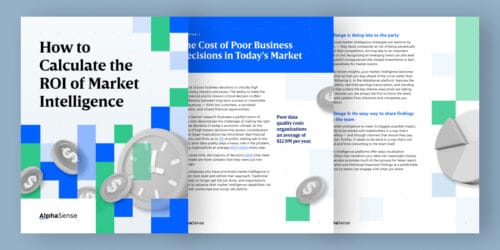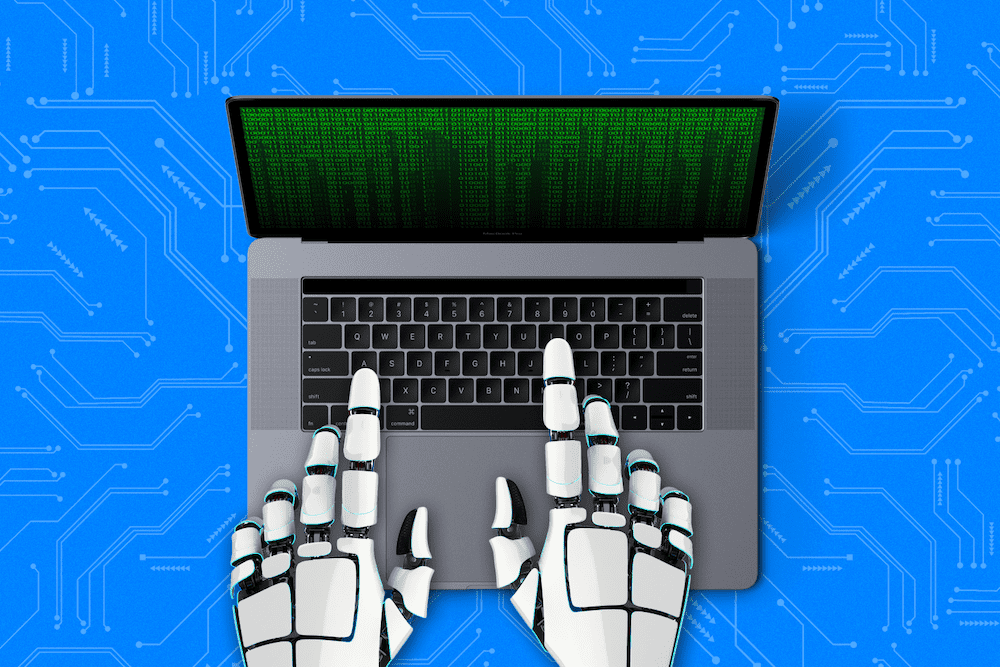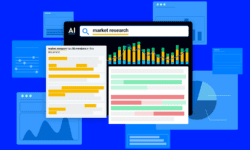
How to Calculate the ROI of Market Intelligence
Get the guide
Over the past decade, every major industry has found a way to wield the incredible power of artificial intelligence (AI) to improve the efficiency and effectiveness of their output. From marketing to cybersecurity and even financial services, AI has proven itself to be a formidable tool with continuously expanding applications and capabilities.
The limitless opportunities of AI, ranging from conversational marketing to AI-based product suggestions, have opened the doors for investors and tech enthusiasts to realize the untapped potential of AI technology and its ability to revolutionize sectors.
Using the AlphaSense platform, we’ve searched through our vast universe of expert calls and earnings transcripts to see how company leaders and industry insiders forecast AI integrations in the coming quarters. Discover these insights, as well as the top AI trends set to shape the 2024 landscape—including generative AI, AI in the workplace, and cybersecurity.
Building Trust in Artificial Intelligence
The quick rise of artificial intelligence and its adoption in thousands, if not millions, of operational processes over the past decade has paved the way for an AI-driven future.
According to McKinsey, AI adoption has more than doubled since 2017. IBM’s 2022 Global AI Adoption Index stated that 35% of companies have implemented AI in their business, while another 42% are reportedly “exploring AI.” The same McKinsey survey also found that 56% of respondents had adopted AI in at least one function in 2021—a 50% increase from 2020.
Despite the argument around AI’s necessity in business, companies that have integrated AI-based practices continue to see higher financial returns than their non-AI-oriented competitors. In fact, companies that adopted AI at its earliest inception continue to invest heavily in scaling their AI development—setting them at the forefront of a growing, competitive market.
Alibaba, the world’s largest e-commerce platform, uses generative AI to predict what customers might want to buy. Their natural language processing (NLP) automatically generates product descriptions for alibaba.com. Apple programs AI and machine learning into their products (iPhone, AirPods, Apple Watch, etc.) to enable innovative features like FaceID or their smart assistant Siri.
And there’s no mention of AI without IBM, which has been at the forefront of artificial intelligence for the past 20 years. Its Project Debater, the tech corporation’s latest AI endeavor, uses a cognitive computing engine that competed against two professional debaters and formulated human-like arguments.
It’s no coincidence that these major companies have taken significant strides to invest in AI. In a study published by Research Reports World, experts predict the artificial intelligence market within the accounting industry will expand at a CAGR of 40.41% in the next four years, reaching a $5222.47 million evaluation by 2027. Similar forecasts are slated for a myriad of other industries, leading to a gold rush for companies and AI inventors alike.
Commercializing AI
While AI, overall, is gaining global traction, it’s important to understand there are various forms of artificial intelligence. The most common types are artificial narrow intelligence (ANI), artificial general intelligence (AGI), and artificial super intelligence (ASI). All three have distinctions in how their functions mimic human intelligence and behavior. However, ANI is potentially the most common form of commercial AI, as it powers Apple’s Siri and Tesla’s autopilot.
ANI is commonly implemented to address use cases in predictive analytics, text-to-speech, image recognition, human-like chatbots, machine vision, natural language processing (NLP), expert systems, robotics, and planning or optimization problems. Or otherwise, very specific, well-defined use cases.
Artificial intelligence has proven to be beneficial for business owners and consumers, but the capabilities and functions of AI depend on a few variables that directly correlate to its value. The effectiveness of any AI software depends on good quality data that also protects users against risks unique to artificial intelligence and, most importantly, your understanding of its capabilities and functions (i.e., what AI can and can’t do for your business).
Artificial Intelligence Trends in 2024
Applications in Cybersecurity
Tech leaders like IBM have been continuously investigating AI’s role in cybersecurity. This has led IBM (and their competitors) to discover how its application extends beyond detecting and identifying abnormal patterns and vulnerabilities within extensive networks. Before AI, this process was a time consuming task for human workers. Today, analyzing and monitoring data from multiple endpoints has become a more straightforward and faster process so that any detection threats can be eliminated before an attack is executed.
AI is also suited to assess risk and improve threat intelligence. By identifying, analyzing, and evaluating risks, AI can recommend strong security controls, leading to automated security models and, consequently, stronger organizational firewalls. Additionally, pertinent operations can be automated, so that response times to attacks are faster while alleviating the pressure off of human analysts for handling complex security tasks.
“[What companies like Darktrace] created is this form of machine learning or AI that essentially detects abnormal in any of your environments, whether that be network, endpoint, or email. Their systems don’t have to know this attack per se, but they just know it’s abnormal to your environment. They’re able to reinforce normal by detecting it and then using another product to then reinforce normal.”
“One of the challenges that you see in the cybersecurity industry is that companies will have siloed defenses. They might have one vendor for email and one vendor for network detection and response. One vendor for an endpoint. Some companies like Darktrace are really trying to sell themselves as this all-inclusive solution.”
– Prior Sales Lead at Darktrace | Expert Call
AI in the Workplace
It’s a widespread fear expressed by workers around the world: AI will replace human workers. A 2023 Gartner study found that 22% of employees expect AI to replace their job in the next five years. However, experts do not predict this to be the case as AI is more likely to lead to the restructuring and revamping of job responsibilities rather than total replacement.
In fact, AI is predicted to play an increasingly large role in hiring and onboarding practices and supporting HR workflows by identifying tailored career growth opportunities for employees and providing career coaching. In terms of reorienting workforce operational efficiency, genAI will boost employee productivity by automating certain work activities and freeing up employees’ time for complex tasks.
Within the AlphaSense platform, we noticed C-Suite leadership focusing on how AI adoption not only streamlines manufacturing processes by performing repetitive, unfulfilling tasks through automation but also creates safer environments for workers. This capability has become a selling point amongst manufacturing leaders who’ve experienced related operational cost reductions.
For example, certain AI systems can detect and prevent workplace hazards and even take real-time action to improve said environments. By mitigating risk and accidents, AI reduces workers’ comp insurance payouts.
“Over the last few years, we’ve seen firsthand how critical the frontline workforce is to business continuity. So we’ve continued to innovate and deliver new products like scheduling and labor optimization. These products leverage AI at their core, and we can generate things like the optimal shift schedules that match worker preferences with business constraints in Workday HCM and finance and even third-party systems.”
– Workday, Inc. | Transcript
“Our model is safety-centric with minimal human-to-machine interaction, leveraging digital technologies, AI, robotics, and sensors not only improves worker safety and labor efficiency but also allows us to collect real-time intelligence by providing process simulation, production optimization, and asset tracking.”
– Novelis, Inc. | Q4 2022 Earnings Call
The Dawn of Generative AI
Perhaps one of the biggest and most impactful trends shaping the future outlook of AI is the meteoric rise of generative AI (genAI). This technology has already taken over every industry—including healthcare, manufacturing, financial services, consumer and retail, and consulting—and has numerous applications for individual use, as well as market research and other business needs.
Having entered the cultural zeitgeist only in 2022, generative AI is now a top-of-mind topic for most organizations, due to its potential for accelerating growth and meeting consumer needs more effectively.
In 2024 and beyond, researchers and enterprises are focused on how this technology can be most practically integrated into our everyday lives and operations. For corporations, this means creating corporate policies that integrate generative AI and create proper guardrails around its usage.
Overall, while there is tremendous excitement for generative AI, most organizations are still in the experimental stage with it. However, in coming months and years, we will likely see more companies investing in generative AI and making organizational changes for effective integration of this technology.
“First of all, their businesses need to be properly digitized. The data need to be in a certain way and format for generative AI to make the best sense of it, and then it can be leveraged. That part, I think, is the biggest gap because companies expect generative AI to make massive impacts, but most of the companies they’re not yet fully ready for that technology to be fully used and leveraged the way it can.”
– Former Group Head, Epam Systems Inc. | Expert Call
Don’t miss our State of Generative AI & Market Intelligence Report 2023.
Higher ROI with AI
While the question of whether investing in AI tools can deliver true ROI continues to fuel debates, there’s no shortage of evidence that companies who have funneled capital into artificial intelligence have experienced results.
According to Domino Data Lab’s recent REVelate survey, which surveyed attendees at New York City’s Rev3 conference in May, nearly half of respondents expect double-digit growth as a result of AI integration, with 79% believing that machine learning and AI are critical to the overall future growth of their company. In fact, 36% label it as the single most critical factor to business success.
Ultimately, ROI from AI is possible. However, it must be clearly described and personified according to one of your business goals.
“In the Q2 call, we shared that a single AI advancement in scaling our recommendations models had led to a 15% watch time gain for Facebook Reels, and that gain has continued to grow. And we expect that there will be additional watch time improvements coming from that work.”
“On the ad side, we’re also continuing to roll out more AI and machine learning improvements in some of the new ads offerings, and we’re encouraged by all of the early examples that we’ve seen. So this is something that we’ll be watching very closely.”
– Meta Platforms | Q3 2022 Earnings Call
Check out our ROI calculator to calculate the value of an AI-based market intelligence platform.
Ethics and Regulation of AI
With AI and genAI taking an increasingly central role in many businesses’ operations and in people’s lives, the ethics and regulation of these technologies are increasingly top of mind. The main ethical concerns with AI usage are privacy and surveillance, bias and discrimination, and inaccurate or unreliable results. That said, a properly configured AI algorithm will eliminate these concerns, as it will follow specific security and data privacy protocols, as well as be trained on reliable and unbiased data.
In 2024 and beyond, the regulatory landscape will continue to evolve worldwide, with each nation taking its own approach to AI standards. Already, we are seeing an explosion of new legislation, including the EU’s AI Act, New York City’s Local Law 144, China’s Generative AI law, and a variety of proposals in the U.S. Congress.
At the same time, on an individual company level, many organizations are adopting ethical AI practices, resulting in enhanced trust from customers and a better reputation. Due to the exponential growth of AI technology, regulatory bodies will be attempting to keep pace with its development, while pivoting and adapting laws as needed.

Staying Ahead of New AI Developments With AlphaSense
Whether you’re conducting research on how your competitors are implementing AI or searching for the next big investment in artificial intelligence, you need a tool that can help you sort through the noise and uncover opportunities.
AlphaSense is a leading provider of market intelligence, including 10,000+ private, public, premium, and proprietary content sources from more than 1,500 leading research providers—all in a single platform.
Our external content sources include trade journals, news, and SEC and global filings. AlphaSense users also have access to two premium and proprietary content offerings.
These are:
- Wall Street Insights® – A collection of broker research from Wall Street’s leading firms, covering global sector themes, industries, and companies from 1,000+ sell-side and independent firms, available within the AlphaSense platform. Research professionals can even preview the contents of a broker report, saving them wasted time and money on potentially fruitless research.
- Expert Insights – 40,000+ transcripts of one-on-one calls with industry experts, competitors, customers, professionals, and former and current executives, with the ability to conduct your own 1:1 expert calls for less.
The AlphaSense platform also delivers unmatched AI search capabilities and features for analyzing qualitative and quantitative research, and can mine unstructured data for the most critical insights, including:
- Automated and customizable alerts for tracking regulatory filings, companies, industries, and potential investments
- Table export tools that support M&A workflows like target lists and due diligence
- Smart Synonyms™ technology that ensures you never miss a source important to your research
- Smart Summaries, our first generative AI feature, summarizes key insights from earnings calls for faster analysis
Sign up for a free trial today to see how AlphaSense can help you get ahead.




